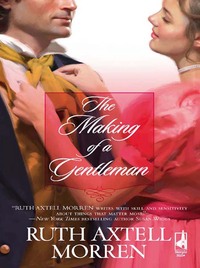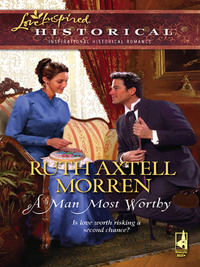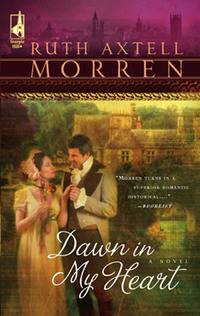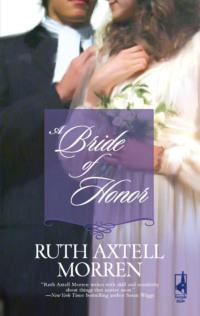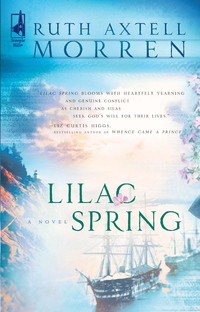
Полная версия
Wild Rose
“Thank you,” Geneva mumbled, reaching out to take the proffered butter, laying the book on the stone wall in the process.
Mrs. Stillman smoothed her starched apron. “Is everything all right with you? You haven’t been by the farm.”
“Right as rain. Been busy with the garden is all.”
Mrs. Stillman nodded.
Geneva shifted the covered crock of butter from one hand to the other.
“Your new neighbor hasn’t been botherin’ you, has he?”
Geneva glanced at her. “Who?”
Mrs. Stillman’s glance strayed down the road to the Point. “The captain. I’ve seen you over there.”
Geneva started. “What’s wrong with giving him a hand?”
“Now, Geneva, I know you don’t like anyone interfering with what you do, and land sakes, you don’t live the kind of life I’d like to see any of my daughters live, but listen when I tell you, that man’s not someone you should get friendly with.”
Geneva straightened her shoulders. “There’s nothing wrong with Cap’n Caleb. He’s a decent, honorable gentleman.”
Mrs. Stillman’s lips tightened. “A woman’s got only one reputation and she’d better do her best to keep it spotless.”
“I ain’t doin’ nothin’ to be ashamed of. That’s more’n I can say for the rest of Haven’s End.”
“Don’t get your dander up. I’m not saying you are. But the less time you spend over there, the better.”
Geneva glared at her but decided she’d said enough.
When Mrs. Stillman saw that Geneva wasn’t going to say anything more, she sighed and smoothed down the front of her apron once more.
“Well, I’ve spoken my piece. I’ll leave the butter with you. You make sure you come by and get a pail of milk. Need to put some meat on your bones.” Her neighbor looked her critically up and down. She’d long ago stopped admonishing her to wear a dress, but never managed to hide her looks of disapproval.
“What’s that you got there?” Mrs. Stillman’s chin jutted toward the book perched on the flat stone.
“Just a book.”
She chuckled. “Where are you going with a book?” Her eyes narrowed in suspicion. “You aren’t going…to lend it to a neighbor?” Her gaze traveled down the road toward the captain’s house.
Geneva looked down at the broken clamshells at her feet, noticing how green and damp the grass was along the edges of her path.
“A young woman oughtn’t be visitin’ a man alone. It’s not proper.”
Geneva wished she could just walk off and leave her nosy neighbor, but she didn’t want to do anything to cause harm to the captain. People were condemning him enough as it was. She thought of the way he’d told her that Miss Harding had broken the engagement and gone with another man. He had stated it so simply, but Geneva had sensed the pain behind the admission.
The captain didn’t need her adding to his woes. He needed her protection from the villagers’ gossip.
She cleared her throat, looking Mrs. Stillman in the eye. “Cap’n Caleb hasn’t done nothin’ that wasn’t proper and decent. I just offered some help to start his garden. There hasn’t been any more to it than that.”
“Well, you take care, my dear. I know you have no one in the world to speak for you. I feel it’s my bounden duty to look after you as if you was my daughter.”
“Yes’m.” Geneva looked at the butter. “Well, I’d best get this out of the sun.” She gave her neighbor a final nod. “I’ll be seein’ ya. Thank you kindly for the butter.” She turned back toward her door, hoping that by the time she came out, Mrs. Stillman would be gone.
She could feel her neighbor’s gaze on her until she closed the door behind her. She waited, peering through her curtain until the older woman climbed back up the hill, before venturing out again.
Captain Caleb was nowhere to be seen outside his yard, so Geneva headed toward the kitchen door, forgetting about Mrs. Stillman as her thoughts turned to her impending reading lesson. Her heart began pounding with each step she took closer to the house.
She heard the captain’s voice immediately after her knock, bidding her come in. She turned the doorknob and entered his kitchen. It was a large room, larger than her entire house including the lean-to. Not as large as the big hotel kitchen down at the harbor, but larger than any other kitchen she’d seen.
“Come on in. I’m back here.”
Geneva followed the captain’s voice through a dining room and into a long, airy room at the back of the house. Her first impression was space. So much empty space. Space and light. The room had a clean, swept feeling. It contained very little furniture. The walls that faced the windows were lined with empty bookcases. She ventured farther along the shiny wooden floors. Two framed pictures hung one atop the other on one wall. Square-rigged ships. She wondered whether they were from his father’s line.
The focal point was the windows, a whole row of them overlooking the sea. It was exactly what she’d imagined it would look like, the view from a house right at the end of the Point.
“That’s the reason I bought this piece of land.”
Geneva jumped at the sound of the captain’s voice behind her.
He came and stood beside her. “I took one look at the view from the old house that used to stand here, and knew this was where I wanted to build my home.”
Geneva just nodded, too awed by the fact that the captain’s thoughts and hers had coincided so perfectly. “It’s the most beautiful spot in Haven’s End.”
He glanced at her. “You’re just up the hill.”
“I look out onto the bay. I like it well enough. But this is the wide-open sea.”
He nodded in understanding. “I imagine the gales blow fierce in winter.”
“You keep a good fire goin’, you’ll be all right.”
He motioned to her book. “Shall we get started? Come, I’ve set up a table out here on the porch. As long as the weather is so nice, I thought we might as well be outside.” He led her through a glass-paned door to a veranda.
Geneva sat and looked from the captain, seating himself so close to her, to her mother’s book in her hands, and finally to the shimmering sea beyond the two of them. Mrs. Stillman, the rest of Haven’s End and Miss Harding were all somewhere far behind them. Only she and the captain existed in this world. Suddenly, she felt as if she were tasting a little bit of heaven.
The captain held out a hand. “May I?”
She nodded and handed him the book.
He laid it on the table and opened it. She saw him frown and began to worry that something was wrong.
He looked at her. “This is in French.”
She stared at him, her thoughts tumbling around, but all pointing in one direction: once again she’d failed.
When she didn’t speak, he asked her, “Do you understand what that means? It’s written in another language. It wouldn’t do you much good to learn to read in French.”
“It was my ma’s. She spoke the language.”
“Your mother was French?”
“Only half. But she was raised in a convent, in Québec. I reckon that’s all they spoke to her up there.”
The captain smiled at her. “You say it like a native. Did your mother teach you her native tongue?”
Geneva shook her head. “No. I heard her say a word now and then, but I didn’t understand it. Pa made her speak English whenever he was around.” She looked beyond him toward the sea. “I remember she’d call me chérie. And she gave me a long, funny-sounding name.”
“Your name is not Geneva?”
She shook her head. “Geneviève.” She pronounced it just the way she used to hear her mother say it, with the airy g sound and the last syllables all running together like a softly expelled breath. “Trouble was, Pa couldn’t say it right, and ended up deciding it should be plain old ‘Geneva,’ but Ma always said it the French way. Geneviève,” she repeated. She turned to see the captain looking at her in wonder. She felt the heat steal into her face. “What’s wrong with that?”
“You say your name exactly as a Frenchwoman would. Your accent is impeccable.”
Her chagrin turned into pleasure. But she just shrugged. “That’s about all I can say.”
The captain closed the book, resting his hand atop it. She remembered his hands, large and capable-looking, from the first time he’d touched her, back on the wharf. They were not so much the gentleman’s hands as they had appeared then, but still appealing, probably more so now that they were toughened by the soil.
“It’s a Bible, you know.”
She pulled her gaze away from his hands. “What? Oh.” She focused on her mother’s book again. “I should have figured. She was always reading it. Especially once she was bedridden.”
“Was she ill very long?”
“Just a year.”
“I’m sorry. How old were you when you lost her?”
Geneva shrugged. “Eight, nine, near as I can reckon.”
“You don’t remember exactly how old you were then?”
“Not exactly. Pa didn’t believe in celebrating things like birthdays.” She gave a bitter laugh. “If I could read, I’d know exactly how old I was. Ma wrote it all down here.” Geneva reached for the Bible, and Captain Caleb pushed it toward her. She opened it to one of the front pages where she knew her mother’s handwriting appeared. She flattened the pages and turned the book back toward the captain, beginning to feel the excitement of uncovering a long-held secret. He leaned over it, seeming as eager as she felt.
“Geneviève Samantha Patterson. Née 5 Mai, 1850.” He looked at her triumphantly.
“You speak French,” she said.
“Just what I learned in school.” He smiled at her. “You, Miss Patterson, were born on May fifth. You just turned twenty-three last month.”
She nodded slowly. “I knew it said five, but I wasn’t sure of the rest.”
“Now that we’ve solved that mystery, we still have the problem of how we’re going to find you something to read. Did you never have any schooling at all?”
“Just a couple of years. Then Ma got sick, and Pa took me out of school to tend to her.”
“You must have been rather young for such a burden.”
“She was no burden. I was glad to do it.” Geneva looked down at the painted wooden table. “Wish I coulda’ done more.”
The captain’s hand covered hers. For an instant she felt an overwhelming desire to turn her hand over and receive his comfort, but she held back. Life had taught her not to rely on anyone or anything.
So she pulled her hand away and clasped it rigidly on the tabletop with her other hand. “When’s this lesson going to begin?”
Captain Caleb withdrew his hand with a chuckle and sat back. He lifted a stone paperweight from the center of the table and removed a sheet of white paper from a small stack. “Let’s see what you remember from your school days.”
Chapter Four
Caleb looked at Geneva’s departing back as she climbed up the slope to her house. He didn’t know which of them felt the more exhausted, pupil or teacher. He tried to look on the bright side. At least she had mastered the alphabet back in school and could form the letters fairly well. She recognized several one-syllable words, though anything more complicated was beyond her. He felt sorry for her, seeing her struggle.
He felt almost as helpless, not sure how to approach teaching her. He tried to remember how he’d been taught in school. School! Like Geneva, he’d only had a couple of years of formal schooling before being yanked out and shipped off to sea. But at least his father had provided a tutor on those journeys. A man who was quick to rap an eight-year-old boy on the knuckles at the slightest sign of fidgeting. And who was fonder of sitting in the captain’s quarters over a glass of brandy than of overseeing a boy’s lessons.
He smiled, understanding the frustration Geneva tried to control but which was so evident each time she missed a word or copied his example incorrectly. It was going to be an uphill struggle—but worth it.
He could feel something stirring in him at the effort to help someone. She was obviously bright, but had suffered nothing but disadvantages since her youth. From the little she’d told him, he could form a vivid picture of the rest. A little girl struggling to nurse a dying woman, left at the mercy of a hard, unfeeling woodsman. No wonder she’d rejected Caleb’s offer of sympathy so emphatically. She probably didn’t know how to accept anyone’s helping hand.
After the lesson and once Geneva had disappeared over the ridge, Caleb watched a buggy come down the road. It held a lone woman, Maud Bradford. He felt mixed emotions at seeing another acquaintance from Boston.
He’d forgotten she summered at Haven’s End. She was an old friend of his mother’s. Part of him yearned for news from Boston, yearned to see a friendly face. But just as strongly, he wished to put everything from Boston behind him. He didn’t want to be reminded of all he’d left behind, to question his decision to leave. Still, he’d survived Nate’s visit. Surely, this would be easy in comparison.
The horse clip-clopped to his gate, and Caleb took his time walking toward it.
Mrs. Bradford waited patiently for him, her face wreathed in a smile as he approached. Despite her gray hair, her face was unlined and held a serene quality that Caleb found hard to resist.
“Hello, Caleb.”
He nodded to her and proceeded to open the gate. When the buggy pulled up at the house, Caleb helped Mrs. Bradford down from her seat.
She looked him up and down. “You’re looking well, Caleb. I must confess I wasn’t quite sure what to expect.”
It was impossible to feel any resentment toward this elegant lady who was his mother’s age, and whom he’d known since he was in short skirts. She’d always spoken her mind, but in such a simple, gentle way that it was impossible to take offense.
“And I must confess,” he told her, “I’d forgotten you summered here in Haven’s End.”
She chuckled. “Am I welcome? I heard from Nate that you weren’t entertaining.”
Caleb smiled at the understatement. “You’re always welcome, as long as you don’t expect too much.”
She gave him a look of sympathetic understanding. “I won’t expect you to do or say anything you don’t feel inclined to.”
“Good. Now, can I invite you in for a cup of tea?”
“That sounds most welcome.”
They walked together into the house, and Caleb guided her toward the back. After he’d brewed a pot of tea, the two sat in two chairs overlooking the sea.
Mrs. Bradford sat back with a sigh of contentment. “I didn’t mean to put you to any trouble, my boy, but this tea is just the thing after my ride out here.” She stirred the spoon around in her cup.
“No trouble at all.” Caleb wanted to ask her about his mother, but held back, reluctant to bring up anything pertaining to Boston.
“Your place is lovely. Lovely, indeed.” She looked around with a smile, not appearing to notice the scant furnishings. She gestured toward the view outside. “The location is simply breathtaking.”
She took another sip of tea. When Caleb made no effort at small talk, she replaced her cup in its saucer. “I promised your mother I’d look in on you.”
He appreciated her directness. “How is she?”
“Don’t you know?” Her clear gray gaze made him feel uncomfortable.
“I haven’t received any news.”
“Nor have you sent her any.”
He rubbed his cheek. “I’ve tried to write on a few occasions. Truly. But the words don’t seem to come.”
She smiled sadly. “I understand. I think she does, too. That’s why she’s giving you time. And that’s why she sent me. I shall give her a full report. It will ease her burden. I’ll say I found you fit and in good spirits, living in a very salutary location.”
“Thank you. It will help knowing she’s not worrying.”
She lifted her eyebrows in a look that said more clearly than words that keeping his mother from worrying was another matter.
They continued drinking their tea. After a few moments, Mrs. Bradford spoke again. “Your father’s firm has issued a formal statement to the press that any allegations against you were completely unfounded. Investigations are continuing to uncover the real perpetrator.”
She looked down at her cup and saucer. “Details were very sketchy, however, to explain how there could ever have been a breath of suspicion surrounding your name. Errors in judgment…hasty accusations…”
Caleb sat still, not sure how the news affected him. So, his father had respected his wishes and not exposed his cousin’s part in the calumny against him. At least Caleb could be grateful for that.
The only thing he felt was the same hollowness he’d experienced from the moment his father had revealed how little he believed in Caleb’s integrity. “Errors in judgment…hasty accusations. How awkward for the firm.”
“It is unfortunate that your father’s formal statement only succeeds in raising more questions than it answers.”
Caleb leaned his head back against his chair. “People will say old man Phelps is covering up for his only son.”
“Oh, no. Surely not. And whatever you may think to the contrary, most people, after having had a chance to consider it well, don’t really think you had anything to do with any irregularities at the firm.”
Caleb raised an eyebrow. “No? I beg to differ. You weren’t the recipient of their looks.”
“Oh, I know it must have been dreadful for you.” She raised a finger to her mouth, touching her lip gingerly. “But don’t you think it made things worse by leaving Boston? Coming here might have helped you in many ways, but it gave the impression to people who don’t know you very well that you were…well, running away from something.”
“At the time, I no longer cared how my actions would be construed.”
“I know you suffered a terrible disappointment.”
Caleb didn’t know whether she was referring to the one with his father or the one with Arabella. Most likely the latter. For all her friendship with his mother, Mrs. Bradford didn’t know him very well. He hadn’t been around Boston for much of his youth, thanks to his father.
“You could return to Boston now, you know,” she continued calmly. “It might be a little difficult at first, but eventually you could pick up where you left off.”
“Pick up where I left off?” Caleb turned to the window, no longer wishing to discuss his life. “It’s beautiful here, isn’t it?”
Mrs. Bradford followed the change in subject without missing a stride. “Yes. That’s why I’ve been rusticating here every summer for the last twenty years. Phineas discovered it with me, although he wasn’t able to enjoy it long thereafter.”
“I’m sorry.” He’d hardly known her late husband.
“Don’t be. He’s in a better place. And I shall join him again someday soon.” She smiled as if in absolute tranquility at the inevitable eventualities of life.
Caleb had achieved no such equanimity as yet. He got up from his chair, suddenly restless.
As if sensing his change in mood, Mrs. Bradford set down her cup and saucer. “Who was that person walking up the road when I drove up? He seemed to be coming from here.”
Caleb turned back to his visitor in surprise. “That was my neighbor. Miss Patterson.”
“A woman?” Mrs. Bradford looked puzzled. “How strange. The way she was dressed…from a distance…that hat shading her features…” She shook her head with a chuckle. “You see a lot of odd characters in these parts. I should be used to that by now.” She tapped her finger against her lip. “Patterson…Patterson. That’s a common family name around here. Wait a minute. She isn’t Big Jeb Patterson’s little girl, is she? He was a woodsman who lived down this road.”
“Sounds like the one, from your description,” Caleb answered.
She shook her head. “My, my. I remember her as this quiet, shy little thing, always looking underfed, wearing faded calico dresses and going around with dirty, bare feet. What was she doing here?”
For some inexplicable reason, Caleb didn’t like the way the conversation was going. “She’s my neighbor. From time to time she’s offered me advice on my garden.” At the question in her eyes, he smiled. “I have to do something with my time, so I thought I’d try my hand at gardening. I enjoy it, actually.”
“I’m glad to hear it. Gardening can be soothing to the soul. How nice that your neighbor has proved helpful.”
It was on the tip of Caleb’s tongue to ask Mrs. Bradford’s advice about some primers for Geneva’s lessons, but he stopped himself before voicing the question.
Perhaps as a reaction against having undergone Mrs. Bradford’s gentle, yet discerning, probing of his own affairs, he felt suddenly protective of Geneva. Her secrets were her own, and he respected that.
He was also getting tired of hearing only negative things about Geneva every time her name came up. Mrs. Bradford’s recollection brought to mind a hungry, unwashed young waif.
He’d order the reading books through the company’s agent in New York, bypassing any questions that would come up through the shipping company’s Boston office. Yes, that was what he’d do.
Jake’s barking alerted Geneva before she heard the crunch of wheels or the clip-clop of hooves, telling her that Captain Caleb’s visitor was departing.
“Hush, Jake,” she said automatically, though she knew he wouldn’t be still until the buggy had passed. Geneva went on with her task, picking off the dead pansy and marigold heads from the flowers she had planted in her front yard. The sweet smell of pinks mingled with the pungent odor of the broken flowers in her hand.
When the sound of buggy wheels stopped and Jake stood stiff-legged by the road, barking for all he was worth, Geneva finally looked up.
She rose at the sight of the buggy at her entrance and dusted off her knees. The woman handling the reins was clearly a lady. Geneva went to Jake and took him by the collar. “Hush, boy. Sit.” Although he obeyed her, she could feel the tension in his body. He was itching to be up again. She soothed him with her hand, running it down his neck, while observing the elegant-looking lady in the buggy. Her dun-colored jacket and skirt were simple, almost mannish, yet they looked well tailored and did not detract from the lady’s femininity.
Geneva watched her loop the reins around the whipstock. When she stood to descend, Geneva stepped forward, holding out a hand to help her down. At the sight of her leaf-stained fingers, and the thought of what they would do to the woman’s hand, Geneva pulled them back.
But the woman held out her hand with a smile, and slowly Geneva reached out once again. The woman was as tall as she was. Geneva always felt awkward, dwarfing most of the women she talked to, yet this woman exuded elegance rather than ungainliness.
“You have a fine watchdog,” the lady said, eyeing Jake approvingly.
It was the first time anyone had ever given Jake a compliment. “Always raising a racket,” Geneva answered, “but he don’t mean no harm.”
“What pretty flowers you have growing,” the lady continued, smoothing down the lapels of her jacket.
“Just ordinary flowers.”
“They make a pretty effect, nonetheless. You have an eye for color.”
“Thank you, ma’am,” she mumbled.
The woman looked at her with frank curiosity. “You wouldn’t be Jeb Patterson’s daughter, would you?”
“Yes’m,” she answered in surprise, unable to imagine this lady acquainted with her father.
“He used to bring me some fine trout. I remember you as a young child.”
Geneva shook her head, still amazed. “Sorry, ma’am, I don’t recollect.”
“No, I don’t expect you do. My name is Maud Bradford. I’ve been coming up here for a good many years during the summer months. I have a house in the village, the yellow one up on a hill, up past the hotel.”
Geneva nodded. “I know it. If you ever be needin’ some fresh fruits or vegetables, I supply some of the summer folks with produce once a week.”
“That would be lovely. Come around anytime.” She looked back down the hill toward the Point. “I was just paying a call on your neighbor, Caleb Phelps. I’m an old friend of the family.”






